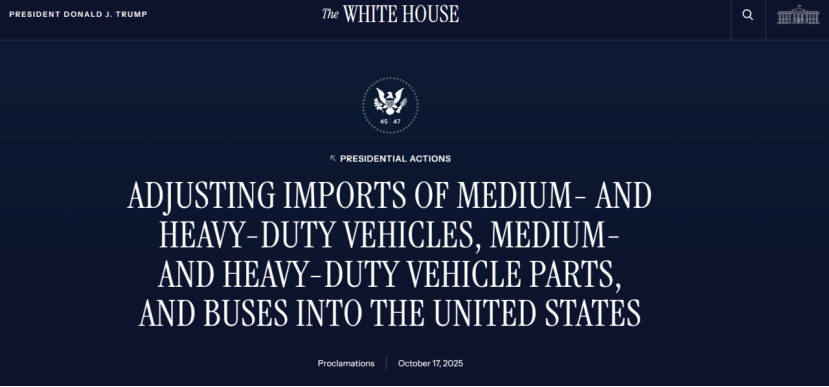Trump Approves Expansion Of United States (US) Auto Production Credits And Imposes 25% New Tariff On Imported Trucks
According to a Reuters report, on October 17, U.S. President Trump signed an executive order to expand the scope of credits related to American automobile and engine production, and starting from November 1, to impose a new 25% tariff on imports of medium and heavy trucks and components.

Image Source: The White House
The executive order states that the imposition of these tariffs is for U.S. national security considerations, aiming to shift more automobile production to the United States. However, this move could deal a significant blow to Mexico, as it is the largest exporter of medium and heavy trucks to the U.S.
In addition, Trump will impose a 10% tariff on imported buses.
According to the executive order signed by Trump, by the end of 2030, automobile manufacturers that assemble vehicles in the United States can receive a tax credit equivalent to 3.75% of the vehicle's suggested retail price to offset the tariffs they need to pay on imported parts.
At the same time, the 3.75% credit policy enjoyed by domestic engine production and domestic medium- and heavy-duty truck production in the United States will also be extended.
The new tariffs cover all Class 3 to Class 8 trucks, specifically including large pickup trucks, moving trucks, freight trucks, dump trucks, and tractor units for 18-wheeler trucks.
Last month, Trump stated that imposing these tariffs was to protect manufacturers from "unfair external competition," a move that would benefit companies such as Daimler Truck's Freightliner and Paccar's Peterbilt and Kenworth.
The U.S. Chamber of Commerce had previously urged Trump not to impose new truck tariffs, pointing out that the top five sources of truck imports to the U.S. are Mexico, Canada, Japan, Germany, and Finland, "all of which are allies or close partners of the U.S. and do not pose a threat to national security."
The executive order will provide economic relief to automakers such as General Motors, Ford, Toyota, Stellantis, Honda, and Tesla to offset the costs incurred due to the import tariffs on auto parts previously imposed by the Trump administration.
【Copyright and Disclaimer】The above information is collected and organized by PlastMatch. The copyright belongs to the original author. This article is reprinted for the purpose of providing more information, and it does not imply that PlastMatch endorses the views expressed in the article or guarantees its accuracy. If there are any errors in the source attribution or if your legitimate rights have been infringed, please contact us, and we will promptly correct or remove the content. If other media, websites, or individuals use the aforementioned content, they must clearly indicate the original source and origin of the work and assume legal responsibility on their own.
Most Popular
-

Dow, Wanhua, Huntsman Intensively Raise Prices! Who Controls the Global MDI Prices?
-

Clariant Unveils Cost-Cutting Plan Details, Plans to Shut Down Multiple Plants
-

[Today's Plastics Market] General Materials Weakly Fluctuate, Engineering Materials Steadily Rise
-

New Breakthrough in Domestic Adiponitrile! Observing the Rise of China's Nylon Industry Chain from Tianchen Qixiang's Production
-

Daily Review: Polyethylene Prices Under Weak Consolidation, Sellers Face Significant Pressure to Move Inventory






